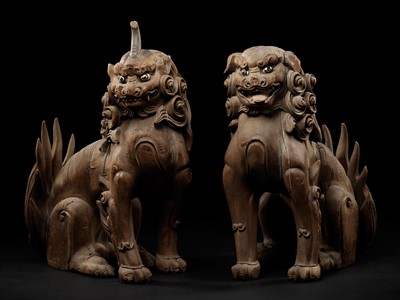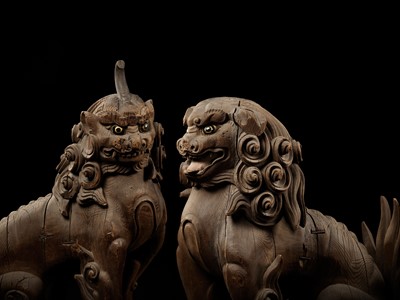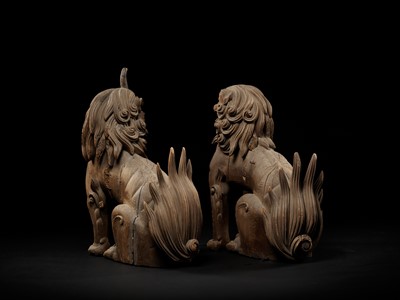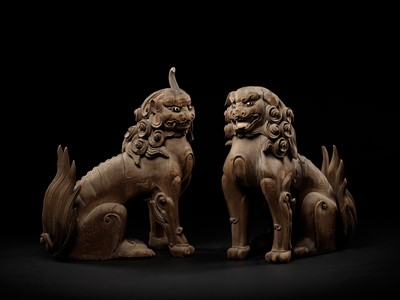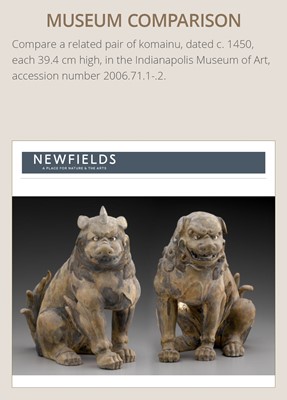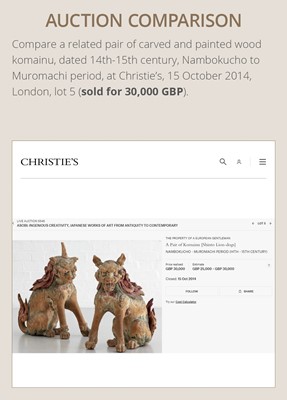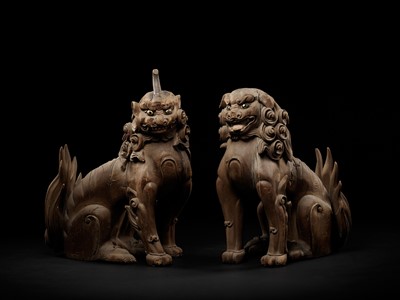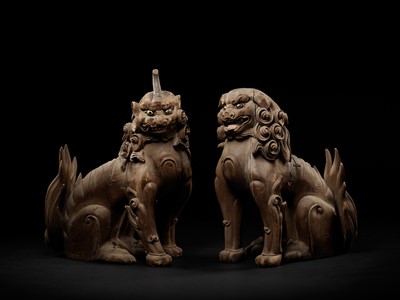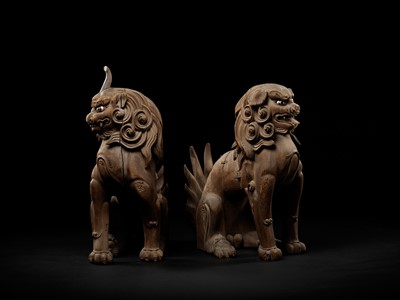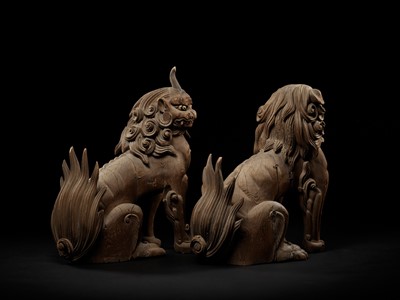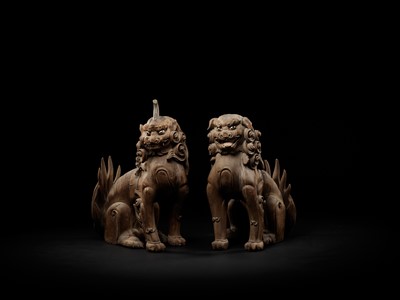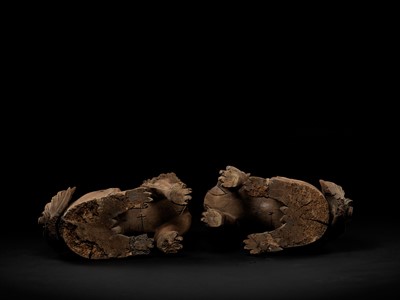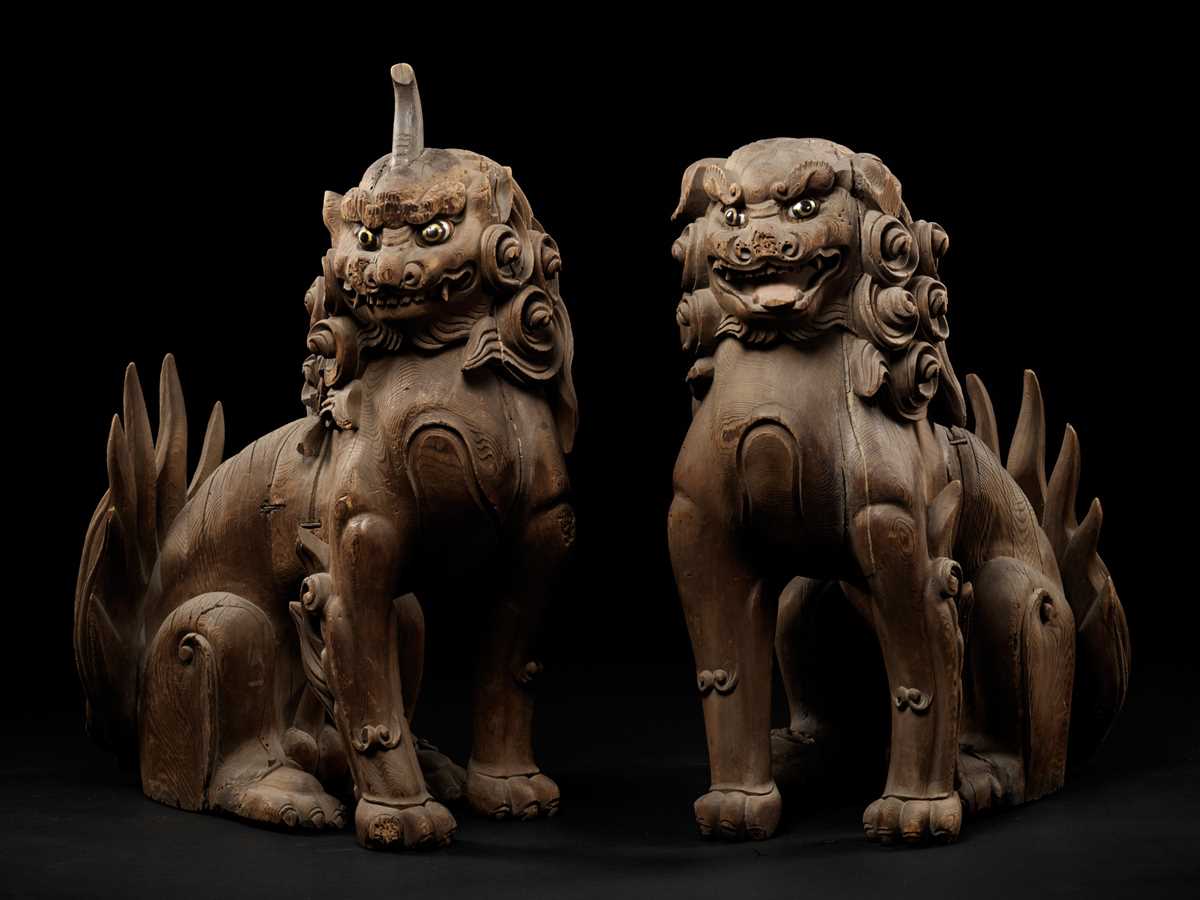16th Jun, 2023 11:00
Fine Japanese Art
46
A PAIR OF WOOD KOMAINU (KOREAN GUARDIAN DOGS), MUROMACHI PERIOD
Sold for €16,900
including Buyer's Premium
Japan, 15th-16th century, Muromachi period (1333-1573)
Each finely carved from cypress wood of an attractive grain and color, seated on its haunches, the flaming tail rising upwards, the head with fierce expression, large painted eyes behind glass, and scrolling mane. One lion with a horn and closed mouth, uttering the syllable ‘um’, the other without the horn and with the mouth open, uttering the syllable ‘ah’.
HEIGHT 83 cm and 74 cm
Condition: Good condition, commensurate with age. Extensive wear, flaking and losses to gesso and pigment, expected age cracks, minor chips, small losses.
Male and female pairs of shishi guard the approaches to the holy enclosures of Shinto shrines. They are usually known as komainu (literally ‘dogs of Koma’ – Koma meaning Kokuryo, one of the three countries of ancient Korea). The lion not being indigenous to Asia, the concept of the shishi was probably originally introduced to Japan through China and Korea via India from the Middle East. They are found in Shinto shrines from the late Heian period onwards standing to the left and right of a pathway or entrance. That on the right has an open mouth, and that on the left has a closed mouth said to signify the universal sounds ‘ah’ and ‘um’ – the beginning and the end. Sometimes early examples have a single horn as with this pair.
Museum comparison:
Compare a related pair of komainu, dated c. 1450, each 39.4 cm high, in the Indianapolis Museum of Art, accession number 2006.71.1-.2.
Auction comparison:
Compare a related pair of carved and painted wood komainu, dated 14th-15th century, Nambokucho to Muromachi period, at Christie’s, 15 October 2014, London, lot 5 (sold for 30,000 GBP).
Japan, 15th-16th century, Muromachi period (1333-1573)
Each finely carved from cypress wood of an attractive grain and color, seated on its haunches, the flaming tail rising upwards, the head with fierce expression, large painted eyes behind glass, and scrolling mane. One lion with a horn and closed mouth, uttering the syllable ‘um’, the other without the horn and with the mouth open, uttering the syllable ‘ah’.
HEIGHT 83 cm and 74 cm
Condition: Good condition, commensurate with age. Extensive wear, flaking and losses to gesso and pigment, expected age cracks, minor chips, small losses.
Male and female pairs of shishi guard the approaches to the holy enclosures of Shinto shrines. They are usually known as komainu (literally ‘dogs of Koma’ – Koma meaning Kokuryo, one of the three countries of ancient Korea). The lion not being indigenous to Asia, the concept of the shishi was probably originally introduced to Japan through China and Korea via India from the Middle East. They are found in Shinto shrines from the late Heian period onwards standing to the left and right of a pathway or entrance. That on the right has an open mouth, and that on the left has a closed mouth said to signify the universal sounds ‘ah’ and ‘um’ – the beginning and the end. Sometimes early examples have a single horn as with this pair.
Museum comparison:
Compare a related pair of komainu, dated c. 1450, each 39.4 cm high, in the Indianapolis Museum of Art, accession number 2006.71.1-.2.
Auction comparison:
Compare a related pair of carved and painted wood komainu, dated 14th-15th century, Nambokucho to Muromachi period, at Christie’s, 15 October 2014, London, lot 5 (sold for 30,000 GBP).
Zacke Live Online Bidding
Our online bidding platform makes it easier than ever to bid in our auctions! When you bid through our website, you can take advantage of our premium buyer's terms without incurring any additional online bidding surcharges.
To bid live online, you'll need to create an online account. Once your account is created and your identity is verified, you can register to bid in an auction up to 12 hours before the auction begins.
Intended Spend and Bid Limits
When you register to bid in an online auction, you will need to share your intended maximum spending budget for the auction. We will then review your intended spend and set a bid limit for you. Once you have pre-registered for a live online auction, you can see your intended spend and bid limit by going to 'Account Settings' and clicking on 'Live Bidding Registrations'.
Your bid limit will be the maximum amount you can bid during the auction. Your bid limit is for the hammer price and is not affected by the buyer’s premium and VAT. For example, if you have a bid limit of €1,000 and place two winning bids for €300 and €200, then you will only be able to bid €500 for the rest of the auction. If you try to place a bid that is higher than €500, you will not be able to do so.
Online Absentee and Telephone Bids
You can now leave absentee and telephone bids on our website!
Absentee Bidding
Once you've created an account and your identity is verified, you can leave your absentee bid directly on the lot page. We will contact you when your bids have been confirmed.
Telephone Bidding
Once you've created an account and your identity is verified, you can leave telephone bids online. We will contact you when your bids have been confirmed.
Classic Absentee and Telephone Bidding Form
You can still submit absentee and telephone bids by email or fax if you prefer. Simply fill out the Absentee Bidding/Telephone bidding form and return it to us by email at office@zacke.at or by fax at +43 (1) 532 04 52 20. You can download the PDF from our Upcoming Auctions page.
How-To Guides
How to Create Your Personal Zacke Account
How to Register to Bid on Zacke Live
How to Leave Absentee Bids Online
How to Leave Telephone Bids Online
中文版本的操作指南
创建新账号
注册Zacke Live在线直播竞拍(免平台费)
缺席投标和电话投标
Third-Party Bidding
We partner with best-in-class third-party partners to make it easy for you to bid online in the channel of your choice. Please note that if you bid with one of our third-party online partners, then there will be a live bidding surcharge on top of your final purchase price. You can find all of our fees here. Here's a full list of our third-party partners:
- 51 Bid Live
- EpaiLive
- ArtFoxLive
- Invaluable
- LiveAuctioneers
- the-saleroom
- lot-tissimo
- Drouot
Please note that we place different auctions on different platforms. For example, in general, we only place Chinese art auctions on 51 Bid Live.
Bidding in Person
You must register to bid in person and will be assigned a paddle at the auction. Please contact us at office@zacke.at or +43 (1) 532 04 52 for the latest local health and safety guidelines.
